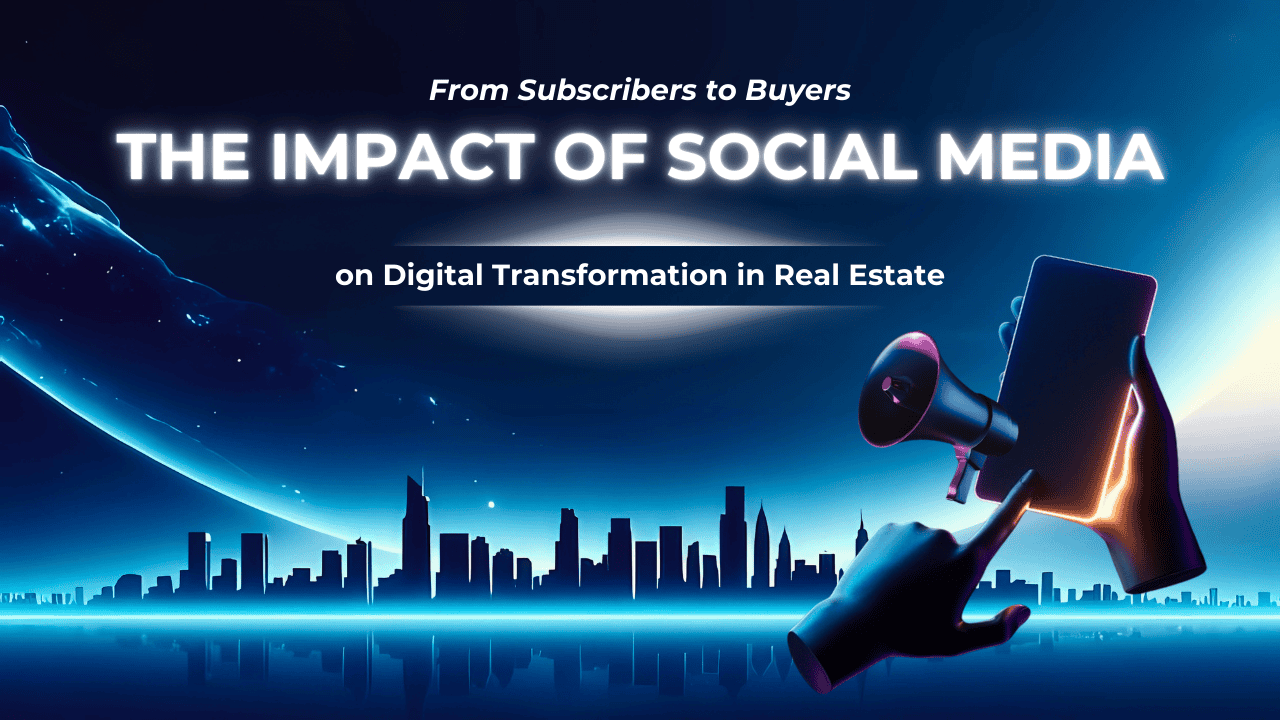Social media’s impact on digital transformation in real estate stands out in today’s fast-paced digital world. Digital advancements are driving a major shift in how real estate companies capture, nurture, and close leads. Social media expands the reach of real estate marketing and actively drives the industry’s digital transformation.
Are you ready to see how social media can revolutionize your real estate strategy? Let’s dive in!
From Print to Pixel: The Role of Digital Platforms as Social Media in the Current Scenario
The real estate sector has always relied on a variety of conventional ways to source leads through print advertising, word-of-mouth discussions, and in-person events to get in touch with prospective clients. These traditional methods are proving inadequate in this digital age when most view a brand for the first time digitally. As such, social media sites including Instagram, Facebook, LinkedIn, and TikTok now form part of how real estate companies communicate with and reach out to their new buyers and renters. This now makes up quite an important part of the marketing strategy.
Digital transformation in real estate involves the transition from traditional, reactive approaches toward a more proactive, data-driven model with the customer at its core. This is supported by social media, leading the charge with real-time insight, targeted ads, and an opportunity to form deeper connections with followers who could eventually become clients.
Transformation from Casual Subscribers to Engaged Buyers
The journey that people make from being mere followers on social media to becoming actual customers of entities offering real estate has ceased to be linear or straightforward. Today, it is all about how social media offers a fertile ground for a continuous relationship-building process in which businesses are constantly engaging with their prospects, nurturing subscribers, followers, likers, and commenters via a slew of engaging content, meaning, and personalized communication approaches. After this, real estate will be able to effectively utilize the interactive functionalities of social media platforms to literally and conscientiously guide them through every step towards successful conversion and transaction.
Take the case of Keller Williams, for instance, the leading and most influential real estate franchise in the real estate arena. This mature company has adopted social media as one of the major drivers for its digital transformation strategy in the real estate industry. Keller Williams communicates powerfully and meaningfully with its audience through various dynamic and resourceful profiles on leading social media platforms like Facebook and Instagram. In this way, from sending visually attractive virtual home tours to showing properties in a new creative manner, homes demonstrate special appeal to the unique tastes and preferences of subscribers. It employs an identified strategy of targeted advertisements, combined even further with follow-up messaging, to systematically and incrementally move these followers into committed and serious buyers.
Social Media as a Powerful Tool for Targeted Marketing
Social media sites are considered to be one of the most powerful tools for implementing focused marketing. The single most considerable advantage of social media in real estate is the fantastic capabilities it holds for highly targeted marketing. From advanced algorithms down to the peculiar targeting options available on varied social media platforms, real estate companies, as well as businesses, have been able to focus highly specific marketing efforts toward precisely the most relevant audience. Marketers design such targeting to be highly specialized, relying on a bundle of varied factors. These include very specific demographics, individual interests, and distinct behaviors, all ensuring that the message reaches exactly those most likely to take action.
For example, targeting on Facebook allows very granular ways of segmenting an audience. That would provide the ability for a real estate enterprise to run ads targeted precisely at any number of discrete groups, such as first-time homebuyers just entering the market, retirees looking to downsize, or investors with a penchant for high-end properties that may offer lucrative opportunities.
A prime and notable example of this trend in transformation within the real estate industry is Redfin. It is an innovative online real estate marketplace that has considerably changed the process through which properties are bought and sold. This website, Redfin, effectively utilized social media to target local buyers based on their specific geographic location and personal interests. By making proper utilization of well-tailored posts and advertisements that had home listings alongside helpful buying tips, it turned its subscribers into actual buyers at a pace considerably faster than achieved through more traditional methods of advertising.
Virtual Tours and Live Interactions
The innovative integrations of virtual tours and live stream technologies within the unfolding digital revolution of the real estate industry act as several game-changers. Real estate agents and enterprises use platforms like Facebook Live, Instagram Stories, and YouTube to virtually navigate with buyers through properties in real-time. This allows probable buyers the immersive and interactive opportunity to see a home in all the minutest detail without necessarily having to physically visit the place from the comfort of their homes.
The increasing popularity and use of virtual tours have been pretty much evident during the pandemic when open houses were becoming rather challenging to manage. Real estate firms, such as the popular Zillow, used the changing circumstances to their advantage by allowing users to take in 3D tours of homes from the convenience of their living rooms. Additionally, they made the listing details accessible by creating ads interactively for prospective buyers on social media platforms like Instagram and Facebook. This was one of the biggest strategies to help generate leads in terms of real estate transactions and greatly increased the subscriber trust to the extent that subscribers were very much likely to go from observers to real-time property buyers.
Data-Driven Insights: Measuring Success
In that sense, the real estate industry’s digital transformation encompasses data to drive fundamental business decisions to feed effective marketing efforts. It is within this context that social media has now become a dynamic tool, offering a set of highly useful analytics that enable firms to follow in great detail and in real-time the level of engagement, the conversion rates of active users, and the real effectiveness of their marketing campaigns. Detailed insights that, besides empowering businesses, provide them with all the relevant information to continuously reconsider and further improve their strategies with the guarantee to communicate the most relevant content and enticing offers to their target audience.
For example, when it comes to real estate technology, a big name is Compass, and its innovative solutions have continued to grace this industry. In developing this firm, high-power analytics in conceptualizing and improving the efficiency of its many social media campaigns play a crucial role. By carefully analyzing and studying the type and nature of the posts and advertisements that are most likely to receive a maximum response from all subscribers, Compass makes the required changes and modifications both in the content and their overall approach toward the clients. This kind of systematic, data-driven approach helps them engage their subscribers and also convert subscribers into buyers with much higher effectiveness.
Building Trust and Relationships
Social media has grown beyond just being a channel for marketing; it has proved to be one of the most potent channels for sustaining long-term relationships with clients. In such a competitive real estate market, trust-building is one of the most important means of converting leads into committed and loyal customers. Through social media, real estate businesses can establish their credibility by showcasing their expertise, offering valuable and informative advice, and having a relationship of meaningful two-way communication with customers.
Douglas Elliman is a well-acknowledged company dealing in luxury estates and positions the platform Instagram as its way of communicating effectively with probable clients. It gives tips and insight into information that may probably help an individual through some real estate process, showing successful transactions that prove its prowess, and giving them a behind-the-scenes view of day-to-day operations and culture. A multidimensional approach, not only helps in humanizing the brand and, therefore, making it more relatable to its audience, but it also will play an integral role in fostering trust amongst its followers. This is what is extremely necessary in converting these engaged people into real buyers in the competitive market of real estate.
Bottom Line: Future of Real Estate Industry in the Digital World
Social media deserves the impact it has on digital transformation in the real estate domain. As the industry evolves dynamically, firms that incorporate social media into their holistic digital strategies position themselves far better to attract prospective customers. As such, these social media platforms serve only to build a following since they offer superior service that brings subscribers through the somewhat complicated buying process. The engagement is real-time, the content is customized to suit the audience, and the various forms of engagement make this even more interactive for customer engagement.
Such being the sector, in which customer experience is so critical, the use of social media tools for digital transformation-shifting from an optional thing to an imperative becomes mandatory. Real estate players will not only be competing with competitors by embracing social media strategies and appropriate integration into a comprehensive digital transformation plan but also be well-set towards thriving in an increasingly digital world.



